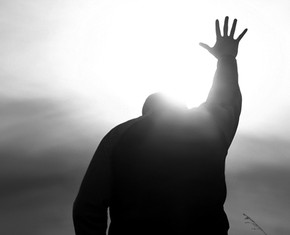The views expressed in our content reflect individual perspectives and do not represent the authoritative views of the Baha'i Faith.
We all have an ego – that sense of inner self-worth which governs our relationships with others. Can we find a way, spiritually, to transcend that ego and discover our true self?
Many of the holy books and scriptures describe the ultimate goal of all spiritual practice as leaving the ego behind in the journey toward increased awareness, unity and love. The Baha’i teachings describe that process of ego-transcendence as a lifelong struggle:
Man must sever himself from the influences of the world of matter, from the world of nature and its laws; for the material world is the world of corruption and death. It is the world of evil and darkness, of animalism and ferocity, bloodthirstiness, ambition and avarice, of self-worship, egotism and passion; it is the world of nature. Man must strip himself of all these imperfections, must sacrifice these tendencies which are peculiar to the outer and material world of existence. – Abdu’l-Baha, The Promulgation of Universal Peace, p. 452.
Life is a constant struggle, not only against forces around us, but above all against our own “ego”. – Shoghi Effendi, Principles of Baha’i Administration, p. 87.
But some may find it hard to believe that anyone could achieve an egoless existence, considering the work of Sigmund Freud and those before and after him. Yet in an ideal sense, those who decide to walk a spiritual path in life consistently endeavor to transcend their egos. They do this because they’ve seen or felt the way an unchecked or inflated ego can act as a destructive force when exhibited in selfish or self-important human beings.
Transcending the ego spiritually means disabling a perverted ego, which cares only for oneself above all other considerations, and which will lie, cheat, harm, or even kill to maintain its status quo or quest for power and domination.
A balanced, healthy combination of the above qualities in themselves are not “bad,” except perhaps for self-conceit. In fact, they are critical to one’s place in a world full of human beings who tend to get along or not, depending on the degree of ego they feel and demonstrate. Ego is a feeling, thinking, acting and reacting continuous state which is always present and usually difficult to isolate because it is so intrinsic to our core. Ego is the mind in hyperdrive, always aware, always ready to react. We have the ability to enhance that awareness by using mindfulness techniques or to dull it by simply not caring.
According to Freud’s main theories, adopted by many, the ego is the part of the mind that mediates between the conscious mind, and your unconscious mind which has two opposing aspects.
Your conscious mind is your awareness of your own thoughts, images, feelings, attitudes, beliefs and sensations, likened to the tip of the iceberg because it represents only a small fraction of your total mind. It is responsible for reality testing and a sense of personal identity. The ego goes deeper, determining how we present ourselves, how we think of ourselves, and what we think of others and what happens in the world. It is the great vacuum cleaner, sucking in all data and trying to make sense of it, for us alone, so we can fit in or change the reality around us.
But, as Freud pointed out, the ego does not act alone. What he called the id, the disorganized, unconscious part of the personality structure, contains a human’s basic, instinctual drives. Id is the only component of personality present from birth. It expresses a person’s bodily needs, wants, desires, and impulses, particularly their sexual and aggressive drives. The id contains the libido, the primary source of instinctual force that is unresponsive to the demands of reality. The id acts according to the “pleasure principle,” the psychic force that motivates our tendency to seek immediate gratification of any impulse and to avoid pain.
We all have instincts and impulses, some we act on immediately, some we delay until later to satisfy. In Freud’s view, we are able to delay gratification through the functioning of the superego, which reflects morality and the internalization of cultural rules, mainly taught by parents, teachers or mentors, applying their guidance and influence. It forms the organized part of the personality structure, mainly but not entirely unconscious, that includes the individual’s ego ideals, spiritual goals, and the psychic agency we commonly called our conscience. It seeks perfection, and criticizes and prohibits one’s drives, fantasies, feelings, and actions, which can lead to anxiety, depression etc.
The super-ego works in contradiction to the id, striving to act in a socially appropriate manner, whereas the id just wants instant self-gratification. The super-ego controls our sense of right and wrong and guilt. It helps us fit into society by getting us to act in socially acceptable ways. Of course, the super-ego’s demands often oppose the id’s, so the ego sometimes has a hard time in reconciling the two.
So the ego is the tightrope walker between two tall, far-away points. Only the wire is constantly moving and never level, never straight, very thin, and extremely difficult to cross. It takes supreme and constant responsive effort by the tightrope walker to make progress, and to anticipate the wire’s next movement so that his or her foot placement will be precise.
So it is with choosing a spiritual path.
Declaring my faith in Bahaullah and his teachings at the age of twenty was a conscious deliberate decision, one followed by my fiancé’s same decision two weeks later. To choose the superego over the id to guide my life, based on Baha’u’llah’s teachings, has been rewarding and fulfilling. Now I’ve found that the path is wide, wide enough for mistakes and continual improvement rather than self-recrimination, anxiety and guilt.
Becoming a Baha’i conferred a bountiful blessing – it allowed me to believe in the inherent goodness of every human being, and to overlook faults and hurts that would have caused me to make biased judgments and angry responses in the past. It has brought me peace – peace in my soul, peace in my heart, and peace of mind.
It has helped me take to heart these words addressed to the beleaguered Baha’is in the land of the Faith’s birth:
Therefore, keep fixed before your eyes God’s consummate wisdom and His unfailing promises; look to the future with optimism; dedicate your lives, as you have always done, to serving humanity; continue to fulfil your individual spiritual responsibilities; engage in meaningful conversation in those social spaces open to you; and participate, to the extent possible, in undertakings and efforts directed towards the common good. Pursue with confidence the path you have chosen, and rest assured that, in the fortitude and endurance you display in the face of such trials and afflictions, you walk in the footsteps of [Abdul-Baha]. – The Universal House of Justice, 14 May 2011, to the Baha’is of Iran.
You May Also Like
Comments

















Carl Jung